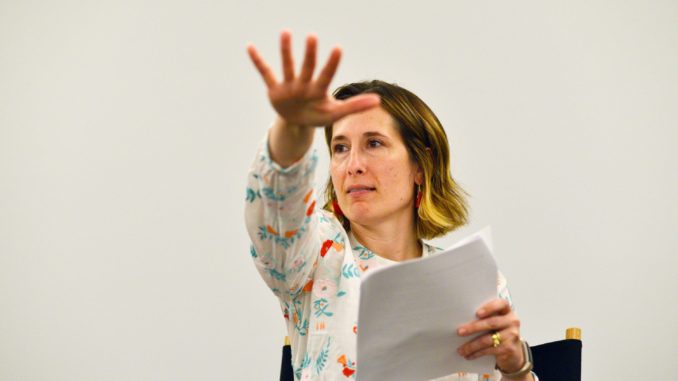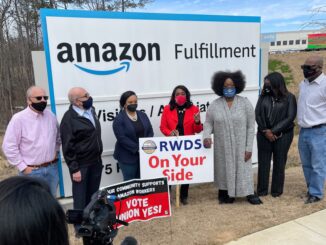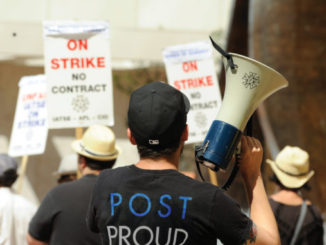
by Debra Kaufman
Time’s Up has come into the editing bay.
On Wednesday evening (Aug. 21), Motion Picture Editors Guild members and guests from other unions gathered to hear two representatives of Time’s Up Entertainment address the topic of sexual assault, harassment, and inequality in the workplace.
Time’s Up Entertainment is the entertainment industry arm of Time’s Up, a workplace safety and advocacy organization. It was the first time that Time’s Up Entertainment has visited a below-the-line industry gathering, according to MPEG National Executive Director Cathy Repola.
Repola introduced the presentation, welcoming Local 700 members as well as other locals including Locals 33, 44, 729, 800, and 871. She stressed her goal of bringing the message of Time’s Up to more members.
Nithya Raman, former Time’s UpEntertainment executive director and current consultant provided background on the impetus behind the group, which arose in response to the sexual misconduct and rape allegations surrounding producer Harvey Weinstein in 2017. Raman shared the stage with Time’s Up Entertainment’s director of initiatives Mara Nasatir, who led much of the discussion.
Women in the industry identified safety and equity as the two major issues to address, Raman said. “Going forward, we’re looking at both of these issues as interconnected,” said Raman.
The presenters pointed out that it’s not a women vs. men issue, because men are discriminated against and harassed as well. What needs to be done, they countered, is to shine a spotlight on a power imbalance and abuse, and find equitable ways to address that.
Nasatir said the Time’s Up Legal Defense Fund, housed at the National Women’s Law Center, has raised $24 million, and is a resource for those seeking legal advice about workplace misconduct.
“If you’re facing sexual misconduct in the workplace, it’s got a network of 800 lawyers who will give you up to two hours pro bono to determine if you want to move forward,” she said. People who decide to proceed with a lawsuit and who need financial assistance can also apply to the Time’s Up Legal Defense Fund for funding to help defray legal costs.
The presenters showed a handout they dubbed “a living document” that they plan to evolve with feedback from meetings like the one at MPEG, and eventually put online. The first pages were resources for women who had been raped or assaulted. Information about how to report misconduct in the workplace was also included. Nasatir asked if attendees knew how to report to a human resources department, and noted that entertainment workers face a more complex employment environment than that of many corporate office workers.

“We have studios and productions, some that are small and only around for a few days and others that are huge and last months,” she said. “Sometimes people work in intimate settings at all hours, everyone sleeping in the same hotel. There’s a lot of variation.”
“In a lot of cases HR isn’t visible or there may be no real HR function. It’s muddled throughout the industry,” she added.
There are still good reasons to log an official complaint, she said.
“It puts the company on notice,” she said. “They can’t deny that it occurred, so if anyone else comes forward, there’s a record.”
Raman and Nasatir acknowledged that, especially in a freelance work environment, a fear of retaliation keeps many people from reporting abuse. Also, it’s often very confusing to know how and where to report a violation. Repola said the Guild can help. “It shouldn’t be painful to find out who to go to,” she said. “Call us and we’ll find out for you.”
Documenting complaints of inappropriate or illegal activity is important.
“I love a paper trail,” said Nasatir. “It’s not only discoverable so that if you have a case you can show you reported it. It’s a great opportunity to go into detail and say that the behavior was unwelcomed and made you uncomfortable.”
Write It All Down
“Write down date, time, who saw or overheard it, what the person did or said specifically,” Repola added. “It lends credibility to the storytelling. Also text your friends or mom.”
With regard to documenting cases of misconduct, suggestions included sending emails to oneself to document what happened to create a time-stamped record. Nasatir also cautioned that if a company provides a reporting mechanism, and a member experiencing misconduct files a lawsuit without first using that mechanism, the company may be able to use that fact as a defense in the lawsuit.
Relying on the government and the courts can be frustrating.
During a discussion of options for legal recourse, Raman pointed out that it takes 10 months on average for the U.S. Equal Employment Opportunities Commission (EEOC) to investigate a complaint. And although California state laws are stronger than elsewhere, the process can still be onerous and drawn out, a problem in an industry of temporary workplaces. “Mara and I found out how poor a fit the traditional employer/employee response is to the entertainment workplace. That’s why we have to come up with systems that work for us in our employment context.”
Raman said that in the future, Time’s Up Entertainment will continue to focus on specific ways to help the entertainment industry.
“As far as safety in entertainment, one of the things we’ve been doing is researching what’s been done in other industries,” she said. “We don’t feel any individual union can solve it on its own.”
In other industries, where working conditions can make it hard to protect workers, there have been models that worked to reduce sexual misconduct and other kinds of abuses like wage theft. Raman pointed to the Coalition of Immokalee Workers in Florida, which organized undocumented farmworkers who worked in tomato farms across the state. Such models provide inspiration for how effective interventions in the entertainment industry could also be structured.
“The buyers of the tomatoes forced the farms to sign a pledge that they will investigate complaints,” said Raman. “They used consumer power to push those farms that have no incentive to take action, and in doing so changed the worker power dynamic. We have to think of something for this industry that changes the power structure. We have the ability to do this, and the unions and guilds need to push for it.”






